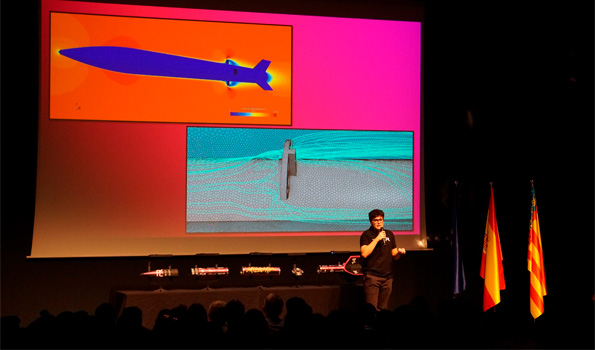Skybraker
46 UPV students, going all out at EuRoC 2025: 'Innovation depends on those of us who are willing to make 100 mistakes before getting it right'
[ 01/10/2025 ]
Faraday Rocketry UPV, the team made up of 46 students from the Universitat Politècnica de València (UPV) dedicated to the design, manufacture and launch of sounding rockets, has officially unveiled its latest project, Skybraker, with which they will represent the UPV in the European Rocketry Challenge (EuRoC), the European rocket championship.
Manufactured entirely at the UPV and based on a modular architecture, Skybraker incorporates a proprietary rocket engine, an aerobraking system, modular avionics to control it during flight, an innovative CO2 parachute ejection system and new manufacturing techniques.
‘Who will lead the European industry in the next 10, 20, 30 years? We will.’
With a speech full of ambition despite competing against much larger budgets, the executive director of Faraday Rocketry UPV, Guzmán Marchesi, explained why ‘46 students from the UPV are working in the workshop from 7 or 8 in the morning until 10, 11, 12 at night or 1 am’.
"The space sector is growing at an incredible pace, and in the next 5, 10, 20 years, it will be one of the world's leading industries. Unfortunately, we hear that Europe is lagging in this context. Last year, 2024, 264 rockets were launched into space, of which only 3 were European. It makes you think... but when you say these things, something is missing: the 'who'. Who will put European industry at the forefront of the sector in the next 10, 20, 30 years? For us, it's very clear: we will. Not just Faraday, but us as UPV students, as young people and as future engineers," said Marchesi.
"We want to become the first university in Europe to reach space, and this rocket is a step in that direction. We believe that at the UPV and in Spain, we have all the capabilities necessary to compete on a European stage against the best universities in the world, teams with years of development and much larger budgets than ours. Our mindset is: if you come to Faraday, leave it as high as possible when you go. If you join an electronics team, when you leave, leave it much better than you found it. Make it your own and make it yours. We want to transmit this mindset to all young people at the UPV, in Spain and around the world. If we keep climbing the ladder, we will gradually take our university and our country to the top,‘ he added.
’Engineering is not only studied, it is also lived"
‘Skybraker is the result of the work of many students from many courses, who learned that engineering is not only studied, but also lived,’ said Luna Marhuenda, technical director of Faraday Rocketry UPV, during the presentation.
"In the end, every piece, every calculation, every simulation, every line of code has involved many people who believed in something that others saw as impossible. Skybraker shows that innovation does not depend on a million-dollar budget, but on all these people who are willing to make 100 mistakes before getting it right."
And that's what they're doing. Confident in the thousands of hours of work put in by the whole team, and bolstered by the fact that they are the only Spanish team selected in the edition with the most applications in the history of EuRoC.
Skybraker, which consolidates two years of the team's technological development and is an updated version of Rompetechos, the rocket launched on 6 August from the Atlas Flight Test Centre in Villacarrillo – a test that validated all the technology – faces a new challenge.
In 2023, with a budget far lower than that of its competitors, Faraday Rocketry UPV won the flight prize, becoming both the first team to win this award and the youngest in the history of the competition to achieve it.
Now, they want to surpass themselves again. Once again, they are ready to take another step forward.
Outstanding news
 Study a degree at the best technological university in Spain
Study a degree at the best technological university in Spain
The Universitat Politècnica de València is ranked number 1 among Spanish technology universities, according to the Shanghai ranking
 National Research Award
National Research Award
Ramón Martínez Máñez has received the "Juan de la Cierva" National Research Award in the area of Knowledge Transfer
 The UPV and Beihang University strengthen their academic and scientific alliance
The UPV and Beihang University strengthen their academic and scientific alliance
The two universities have signed a new collaboration agreement as part of the celebration of "UPV Day" in China
 Study in English
Study in English
The UPV offers eight degrees, 16 master's and 650 courses in English for the 2025-26 academic year
 THE Impact Ranking
THE Impact Ranking
The UPV, the Spanish university with the greatest social and economic impact in the world






